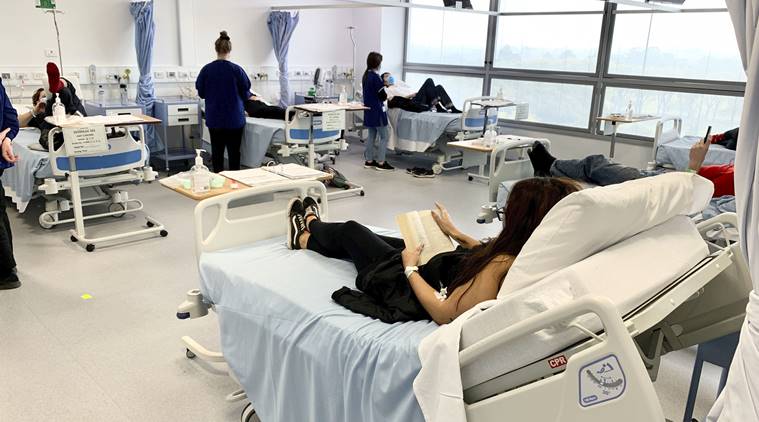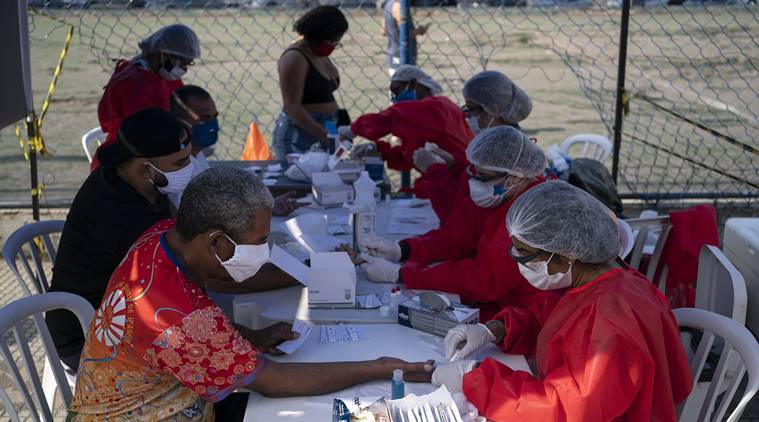Imperial College promises low-cost access to vaccine; China’s first jab by autumn
While some potential vaccines have emerged in the global race to find a way to stop the spread of Covid-19, there seems to be a prestige battle going on between the US and China over which country can immunise its citizens first. As of Tuesday, Covid-19 has affected more than 7.11 million people globally and resulted in 406,225 deaths.
Just days after President Donald Trump said the US had already produced two million doses that are “ready to go” if they “check out for safety”, China recently claimed that the country could have a Covid-19 vaccine as early as autumn.
In other developments, scientists from London’s Imperial College said they hope to bring a low-cost vaccine to the world early next year via a social enterprise — a company that seeks to do good as well as making a profit.
As of now, there are 224 candidate vaccines in development globally, according to the data collected by the Coalition for Epidemic Preparedness Innovations (CEPI). While North America has the largest number of projects — 49 per cent — China is the furthest along the track with five vaccines in phase II human trials, more than any other country.
? London’s Imperial College, which is developing a coronavirus vaccine based on self-amplifying RNA technology, has set up a special company to distribute it if they are successful, rather than partnering with a big pharmaceutical company, to ensure access for the world’s poorest.
“Right now we think the focus should be on how to solve the problem rather than how to make money out of it,” said Simon Hepworth, director of enterprise at Imperial. The social enterprise, called VacEquity Global Health (VGH), is backed by Imperial College and Hong Kong-based Morningside Ventures.
The RNA vaccine developed by Imperial College delivers genetic instructions to muscle cells to make the “spike” protein on the surface of coronavirus. The presence of this protein provokes an immune response, offering protection against Covid-19.
The vaccine is now due to enter phase one and two human clinical trials on June 15 with 300 people. A further trial involving 6,000 people is planned for October and if these prove successful, Imperial hopes the vaccine could be distributed in the UK and abroad early next year
? With China promising to strengthen international cooperation in future clinical vaccine trials, a top respiratory expert has claimed that the country could have a jab for ’emergency use’ within months.
Dr Zhong Nanshan said during an event that a coronavirus vaccine could be available as early as this autumn even though he stopped short of naming the candidate. “Some of them could be used for emergency maybe by the end of this year. We believe in the autumn or winter this year if they are needed for an emergency,” he said.
Nanshan, who had appointed to lead China’s fight against coronavirus outbreak, said mass vaccination, not herd immunity, could help tackle the pandemic.
A government white paper “Fighting COVID-19: China in Action” published on Sunday revealed that at least five vaccines developed by Chinese scientists are undergoing human trials. The white paper stated that the country’s researchers are developing vaccines using five technical routes – inactivated vaccines, recombinant protein vaccines, attenuated influenza virus vaccines, adenoviral vector vaccines and nucleic acid vaccines, reported CGTN.
 Clinical trial participants are given a coronavirus vaccine in Melbourne, Australia. (AP)
Clinical trial participants are given a coronavirus vaccine in Melbourne, Australia. (AP)
? Britain’s AstraZeneca, which last week said it had started to mass-produce its experimental AZD1222 vaccine developed by Oxford University, has approached US rival Gilead Sciences about a possible merger, Bloomberg reported.
Gilead has also been in the vanguard of Covid-19 treatments and its remdesivir antiviral is the first drug to lead to improvement in patients in formal clinical trials.
Such a deal would unite two of the drug makers at the forefront of the industry’s efforts to fight the new coronavirus and could be politically sensitive as governments seek control over potential vaccines. If combined, the two companies would have a market capitalisation of about $232 billion.
“So far we’re still on track… we are starting to manufacture this vaccine right now, and we have to have it ready to be used by the time we have the results,” AstraZeneca chief executive Pascal Soriot told BBC radio. “Our present assumption is that we will have the data by the end of the summer, by August, so in September we should know whether we have an effective vaccine or not,” he further said.
? Researchers at Children’s Hospital of Philadelphia (CHOP) in the US have identified regions of the SARS-CoV-2 virus that causes Covid-19 to target with a vaccine, by harnessing tools used for the development of cancer immunotherapies.
The researchers employed the same approach used to elicit an immune response against cancer cells to stimulate an immune response against the novel coronavirus, PTI reported.
 A health worker takes a blood sample from a man to test for COVID-19 amid the new coronavirus pandemic at a plaza in Duque de Caxias, Brazil. (AP)
A health worker takes a blood sample from a man to test for COVID-19 amid the new coronavirus pandemic at a plaza in Duque de Caxias, Brazil. (AP)
“In many ways, cancer behaves like a virus, so our team decided to use the tools we developed to identify unique aspects of childhood cancers that can be targeted with immunotherapies and apply those same tools to identify the right protein sequences to target in SARS-CoV-2,” said John M Maris, a pediatric oncologist at CHOP, and a professor at the University of Pennsylvania.
The researchers looked for regions that would stimulate a memory T-cell response that, when paired with the right B cells, would drive memory B cell formation and provide lasting immunity and do so across the majority of human genomes.
? Coming to India, Bharat Serums and Vaccines Ltd (BSVL) has said it had received approval from the drug regulator to conduct clinical trials on existing drug “Ulinastatin” for potential treatment of patients with Covid-19 suffering from acute respiratory distress syndrome.
A PTI report said BSVL has received approval to conduct phase-III clinical study on ulinastatin for mild-to-moderate acute respiratory distress syndrome (ARDS) patients with COVID 19. Ulinastatin is currently approved in India for severe sepsis and acute pancreatitis.
“The clinical trials will be conducted in Covid-19 patients who are serious and are being hospitalised because of ARDS. Identifying effective antiviral agents and therapies to combat underlying pathology of COVID-19 is the need of the hour,” BSVL MD and CEO Sanjiv Navangul told PTI.
Patients with severe coronavirus infection can develop fatal lung damage from a cytokine storm due to increase in pro-inflammatory cytokines. Ulinastatin could combat underlying inflammatory condition in Covid-19 patients experiencing mild-to-moderate ARDS, BSVL said.
Indian express
